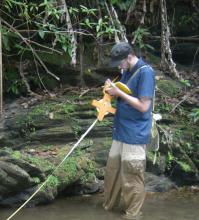Christopher Stieha
Master's in Biology 2008, University of Kentucky
BS Biology, BA Chemistry 2003, University of Kentucky
As global climate change and human encroachment fragment habitats, understanding the spatial mechanisms for the maintenance of competing species and individuals is vital for conservation. For my dissertation research, I combine mathematical models and field research to understand the maintenance of both sexes in a clonal plant with extreme intersexual competition. I use mathematical models to develop hypotheses and predictions for the maintenance of the sexes under intense competition, which I then test at various spatial scales using the variation among populations and among streams in the field. Populations of the plant Marchantia inflexa can exist with only females, only males, or with both sexes. Streams containing aggregates of populations can contain only females, only males, or both sexes. I am particularly interested in the maintenance of the sexes considering the spatial configuration of aggregates of populations, such as size of the populations, distance between populations, and the density of populations. Taking a spatial approach allows me to understand the real world as well as understand the importance of interactions between populations and the effects of fragmentation on the maintenance of the sexes.
Aggressive Interactions between Two Plant Species - Fulbright Fellowship
Organization of Tropical Studies - Costa Rica
Rohr, J.R., Sesterhenn, T., Stieha, C. 2011. Will climate change reduce the effects of a pesticide on amphibians?: Partitioning effects on exposure and susceptibility. Global Change Biology. 17:657-666, doi: 10.1111/j.1365-2486.2010.02301.x
Groen, K.E., Stieha, C., Crowley, P.H., and McLetchie, D.N. 2010. Sex-specific plant responses to light and canopy openness: Implications for spatial segregation of the sexes. Oecologia. 162(3): 561-570.
Groen, K.E., Stieha, C., Crowley, P.H., and McLetchie, D.N. 2010. Sex-specific plant responses to two light levels in the liverwort Marchantia inflexa. Bryologist. 113(1): 81-89.
García-Ramos, G., Stieha, C., McLetchie, D.N., and Crowley, P. 2007. Metapopulation Sex Ratio Dynamics and Coexistence of the Sexes under Asymmetrical Competition. J. Ecology. 95:937-950
Crowley, P.H., Stieha, C.R., and McLetchie, D.N. 2005. Overgrowth Competition, Fragmentation and Sex-Ratio Dynamics: A Spatially Explicit, Sub-Individual Based Model. J. Theor. Biol. 233:25-42.
- "Transcriptional profiles in Strongyloides stercoralis males reveal deviations from the Caenorhabditis sex determination model."Scientific reports11.1(2021):8254.Details. Full text
- "The impact of asexual and sexual reproduction in spatial genetic structure within and between populations of the dioecious plant Marchantia inflexa (Marchantiaceae)."Annals of botany122.6(2018):993-1003.Details. Full text
- "Moving forward in circles: challenges and opportunities in modelling population cycles."Ecology letters20.8(2017):1074-1092.Details. Full text
- "The Effects of Plant Compensatory Regrowth and Induced Resistance on Herbivore Population Dynamics."The American naturalist187.2(2016):167-81.Details. Full text
- "The dispersal process of asexual propagules and the contribution to population persistence in Marchantia (Marchantiaceae)."American journal of botany101.2(2014):348-56.Details. Full text



